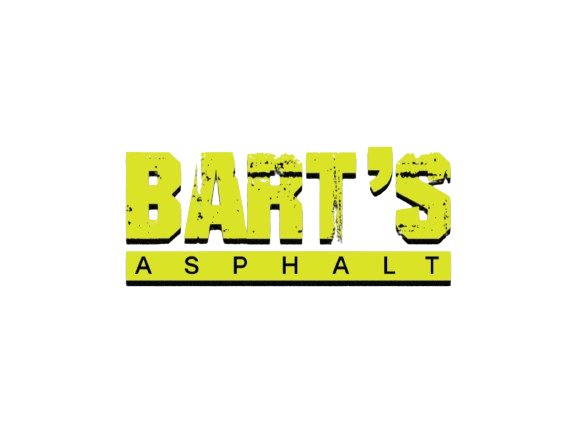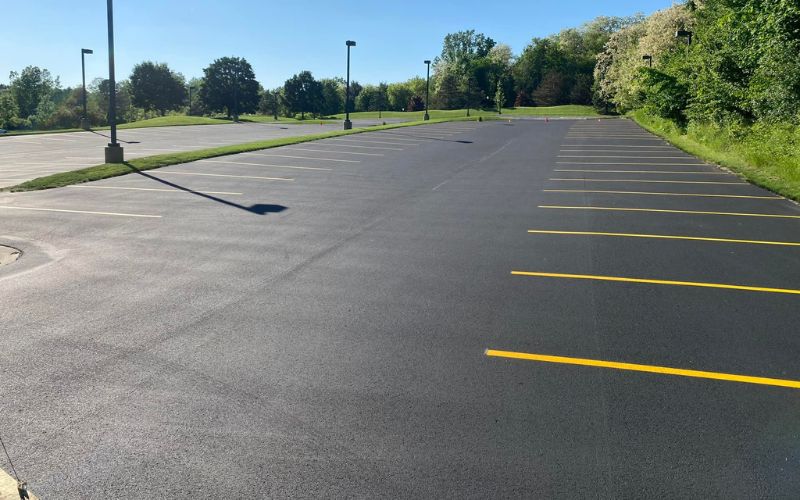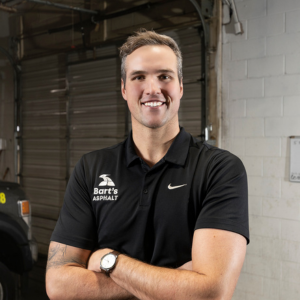In the competitive commercial landscape of Ann Arbor, protecting your property investment is more than a maintenance task—it’s a critical business strategy. Sealcoating emerges as a powerful tool for commercial property managers, offering a comprehensive solution to preserve, protect, and enhance asphalt surfaces that are constantly challenged by Michigan’s demanding environmental conditions.
From the bustling State Street corridors to the expansive parking lots near the University of Michigan, commercial properties face a relentless assault of environmental and mechanical stressors. Sealcoating represents a sophisticated defense mechanism that goes far beyond simple surface protection, providing a strategic approach to infrastructure maintenance that can potentially save businesses tens of thousands of dollars in long-term repair and replacement costs.
Understanding Sealcoating: More Than Just a Surface Treatment
Sealcoating is a complex scientific process that goes far beyond a simple protective layer. At its core, this treatment involves applying a specialized protective emulsion to asphalt surfaces, creating a molecular-level barrier that shields against environmental and mechanical damage. The process involves carefully formulated materials that bond with the existing asphalt, filling microscopic surface voids and creating a resilient protective coating.
The molecular mechanism of sealcoating is remarkably sophisticated. The specialized emulsion penetrates the asphalt’s surface, creating a unified protective layer that resists water penetration, blocks UV radiation, and provides a sacrificial surface that absorbs daily wear and tear. Unlike residential applications, commercial sealcoating requires more advanced formulations that can withstand intense traffic, chemical exposures, and extreme environmental conditions.
Commercial sealcoating differs dramatically from residential treatments in both composition and application. Professional-grade sealants contain higher concentrations of protective solids, specialized polymers, and reinforcing additives specifically designed to withstand the demands of business properties. These advanced formulations provide enhanced durability, increased skid resistance, and superior protection against automotive fluids and environmental challenges.
Ann Arbor's Unique Environmental Challenges
Ann Arbor presents a particularly challenging environment for commercial asphalt surfaces. The region experiences dramatic seasonal variations that create a perfect storm of pavement deterioration. Winters bring intense freeze-thaw cycles that can cause catastrophic damage to unprotected surfaces, while summers introduce extreme heat and UV radiation that accelerates asphalt oxidation.
The University of Michigan’s presence adds another layer of complexity to local pavement maintenance. High-traffic areas near campus experience concentrated vehicle movement, frequent delivery traffic, and seasonal variations in usage that create unique stress patterns. Parking lots and roadways must withstand thousands of vehicles during move-in periods, football weekends, and other high-impact events.
Road salt and chemical deicers, essential for winter safety, create additional challenges for asphalt surfaces. These chemicals penetrate microscopic surface openings, breaking down the asphalt’s structural integrity and accelerating deterioration. Sealcoating provides a critical protective barrier that mitigates these damaging effects, creating a resilient surface that can withstand Michigan’s harshest environmental conditions.
Economic Benefits of Professional Sealcoating
The financial advantages of professional sealcoating extend far beyond simple surface protection. A comprehensive cost-benefit analysis reveals dramatic long-term savings for commercial property managers. While the initial investment in sealcoating may seem significant, the potential cost avoidance is substantially more impactful.
Comparative financial analyses demonstrate compelling economic benefits:
- Reactive repair costs: $20-$50 per square foot
- Proactive sealcoating maintenance: $5-$10 per square foot
- Complete pavement replacement: $75-$100 per square foot
These figures illustrate the profound financial advantages of a strategic sealcoating approach. Properties with comprehensive sealcoating programs typically experience up to 50% reduction in long-term maintenance expenses. The protection extends beyond direct repair costs, encompassing reduced liability risks, enhanced property value, and improved aesthetic appeal.
Protecting Your Commercial Investment
Sealcoating serves as a comprehensive protection strategy for commercial asphalt surfaces. The treatment creates a multi-layered defense mechanism that addresses multiple potential damage sources. UV radiation, which can cause rapid asphalt oxidation, is effectively blocked, preserving the pavement’s flexibility and structural integrity.
Water penetration represents one of the most significant threats to asphalt surfaces. Sealcoating creates an impermeable barrier that prevents moisture from infiltrating the pavement structure, stopping the destructive cycle of water-related damage. This protection is particularly crucial in Michigan’s challenging climate, where freeze-thaw cycles can rapidly destroy unprotected surfaces.
The aesthetic benefits of sealcoating should not be underestimated. A freshly sealed surface restores the rich, dark appearance of new asphalt, creating a professional first impression for customers and visitors. This visual enhancement goes beyond simple appearance, signaling to customers that a business invests in its infrastructure and pays attention to detail.
Technical Aspects of Sealcoating
The science of sealcoating has evolved into a sophisticated technical discipline that combines advanced material engineering with precise application techniques. Modern commercial sealcoating goes far beyond simple surface coating, involving complex chemical formulations designed to provide maximum protection and performance in challenging environmental conditions.
Advanced sealcoating technologies utilize specialized polymer-modified emulsions that offer superior flexibility and durability. These advanced materials are engineered to create a seamless protective barrier that bonds deeply with the existing asphalt surface. The molecular structure of these sealants allows for exceptional resistance to environmental stressors, including UV radiation, chemical exposure, and mechanical wear.
The application process is a carefully choreographed technical procedure that requires extensive expertise and specialized equipment. Professional application begins with comprehensive surface preparation, including thorough cleaning, addressing surface imperfections, and ensuring optimal conditions for sealant adhesion. Specialized application techniques ensure even coverage, precise material distribution, and maximum protective performance.
Different commercial environments demand specialized sealcoating approaches. High-traffic areas require more robust formulations with enhanced durability and wear resistance. Temperature and humidity considerations play a critical role in determining the optimal application conditions, with professional applicators carefully monitoring environmental factors to ensure maximum sealant performance.
Industry-Specific Sealcoating Strategies
Commercial sealcoating is not a one-size-fits-all solution. Different industries present unique challenges that require tailored approaches to asphalt protection. Retail properties, with their high customer traffic and frequent vehicle turnover, demand different strategies compared to industrial facilities or educational campuses.
Retail commercial properties require sealcoating solutions that prioritize aesthetic appeal and durability. The parking lot serves as the first point of customer interaction, making appearance and condition critical to business success. Specialized sealcoating formulations for retail spaces focus on maintaining a rich, dark appearance while providing maximum protection against heavy traffic and frequent turning movements.
Industrial and manufacturing facilities present more complex sealcoating challenges. These properties experience heavy vehicle traffic, potential chemical exposures, and extreme mechanical stress. Sealcoating solutions for industrial properties must provide enhanced resistance to oil, grease, and other industrial chemicals. Advanced formulations with specialized additives offer superior protection against these unique environmental challenges.
University and educational properties require a comprehensive approach that accounts for seasonal variations and intense traffic patterns. Move-in and move-out periods create concentrated stress on parking areas, while special events like football games introduce additional maintenance challenges. Sealcoating strategies for these properties must provide exceptional durability and quick recovery between high-impact usage periods.
Environmental and Sustainability Considerations
The evolution of sealcoating technologies has brought significant advancements in environmental sustainability. Modern sealcoating solutions are increasingly focused on reducing environmental impact while maintaining exceptional performance. Eco-friendly formulations now offer alternatives that minimize carbon footprint and provide sustainable protection for commercial asphalt surfaces.
Advanced sealcoating materials now incorporate recycled components and utilize more environmentally responsible production processes. Manufacturers are developing low-VOC (volatile organic compound) formulations that reduce environmental impact without compromising protective capabilities. These innovations represent a critical step towards more sustainable infrastructure maintenance practices.
The long-term environmental benefits of professional sealcoating extend beyond immediate surface protection. By extending the lifecycle of asphalt surfaces, sealcoating reduces the need for complete pavement replacement, thereby conserving resources and minimizing waste. The reduced maintenance requirements translate to lower environmental impact over the long term.
Timing and Frequency of Sealcoating
Michigan’s unique climate creates specific considerations for sealcoating timing and frequency. The optimal application window typically runs from late spring through early fall when temperatures consistently remain above 50°F with minimal precipitation. These conditions ensure proper material curing and maximum protective performance.
The frequency of sealcoating depends on multiple factors, including traffic volume, environmental exposure, and initial surface condition. Most commercial properties in Ann Arbor benefit from sealcoating every 2-3 years, though high-traffic areas may require more frequent treatment. Factors such as UV exposure, chemical interactions, and mechanical stress all influence the optimal reapplication timeline.
Professional assessment plays a crucial role in determining the ideal sealcoating schedule. Experienced contractors can provide comprehensive evaluations that consider the specific challenges of each commercial property. These assessments take into account traffic patterns, environmental exposures, and existing surface conditions to develop a customized maintenance strategy.
Bart's Asphalt Approach to Commercial Sealcoating
Our approach to commercial sealcoating represents the culmination of decades of local expertise and cutting-edge technological innovation. We go far beyond standard application techniques, offering a comprehensive infrastructure protection strategy that addresses the unique challenges of Ann Arbor’s commercial properties.
Local knowledge forms the cornerstone of our sealcoating methodology. Our team understands the specific environmental and structural challenges faced by businesses in the Ann Arbor area. This hyperlocal expertise allows us to develop customized sealcoating solutions that provide maximum protection and long-term value.
Advanced diagnostic technologies enable us to provide unprecedented insights into asphalt condition and maintenance needs. We utilize state-of-the-art assessment tools to create comprehensive sealcoating strategies that address both immediate protection and long-term infrastructure preservation. Our approach combines cutting-edge technology with deep local understanding to deliver exceptional results.
Conclusion
Professional sealcoating represents a sophisticated, strategic approach to commercial property maintenance. For Ann Arbor businesses, it provides a comprehensive solution that protects financial investments, enhances property appearance, and ensures long-term infrastructure durability.
Frequently Asked Questions
Q: How often should our commercial property be sealcoated? A: In Michigan’s challenging climate, most commercial properties benefit from sealcoating every 2-3 years. However, the exact frequency depends on specific factors like traffic volume, environmental exposure, and initial surface condition. A professional assessment can provide the most accurate recommendation for your specific property.
Q: Will sealcoating completely prevent all asphalt damage? A: While sealcoating provides exceptional protection, it is not an absolute preventative measure. It significantly reduces damage and extends pavement life, but cannot completely eliminate all potential deterioration. Regular maintenance and professional inspections remain crucial for long-term pavement health.
Q: How long does sealcoating take to apply? A: The application process typically takes 24-48 hours, depending on the size of the area and specific environmental conditions. Our team works to minimize business disruption, often scheduling applications during off-peak hours or weekends to reduce operational impact.
Ready to protect and enhance your Ann Arbor commercial property? Contact Bart’s Asphalt for a comprehensive sealcoating assessment and customized maintenance strategy.



